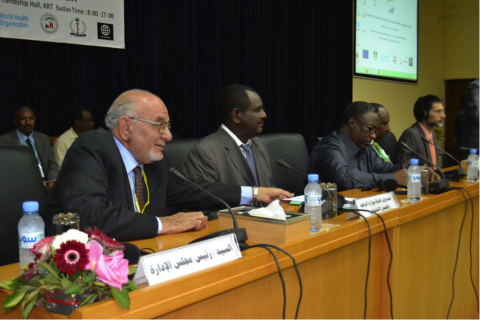
As part of the EU-LUX-WHO Partnership, national and international speakers attended a conference on UHC in Sudan in January 2014. Recognizing that Sudan has adequate infrastructure and staff and its health system is robust enough to support UHC, several reforms were suggested during the conference.
In particular, the need was raised to amend the law, making health insurance mandatory for all sections of the population and/or rapidly scaling up the government-subsidized coverage of the poor and other vulnerable populations. Recommendations to increase funding were given, ranging from innovative financing schemes (i.e. earmarking of taxes and fees) and adjusting the co-payment rates while ensuring that people do not face financial hardship when seeking health care.
Other recommended measures were the establishment of an autonomous body for determining benefits and tariffs, granting autonomy to government health care providers, and instituting an accreditation program. Likewise, there were suggestions on defining the service package and costing for different levels of care; introduction of contracting; and shifting from fee-for-service to other provider payment mechanisms.
“The stakeholders should now come to the table, identify the way forward and develop the plan of action for achieving UHC,” said Dr. Anshu Bannerjee, the WHO Representative in Sudan. The national health insurance fund has established a steering group and the recommendations of the conference are being transformed into practical actions.
Sudan has already taken some strategic steps towards UHC, such as the National Health Sector Strategic Plan (2012-16). The health sector strategy aims at achieving UHC, and one of the means by which it hopes to do that is by launching a primary health care expansion programme. The Federal Ministry of Health (FMOH) has stated a policy of integration and task shifting to primary and community care.
To improve the situation especially in regard to the delivery of integrated services, programmes are addressing Sudan’s high burden of diseases and related health priorities while targeting under-served populations to improve equity to access. One such programme is a joint project between the FMOH, United Nations Development Programme (UNDP) and WHO that trains, equips and deploys Community Health Workers in order to improve health outcomes and health status. These programmes are seeking to provide affordable, socially acceptable health care to the community.
In addition to this, WHO provided assistance in defining an integrated community health care package, and substantial work was done for health facilities to act as one-stop-shop for providing integrated health services and referral support for community care. All of these initiatives are ensuring that UHC is gaining momentum in Sudan.
